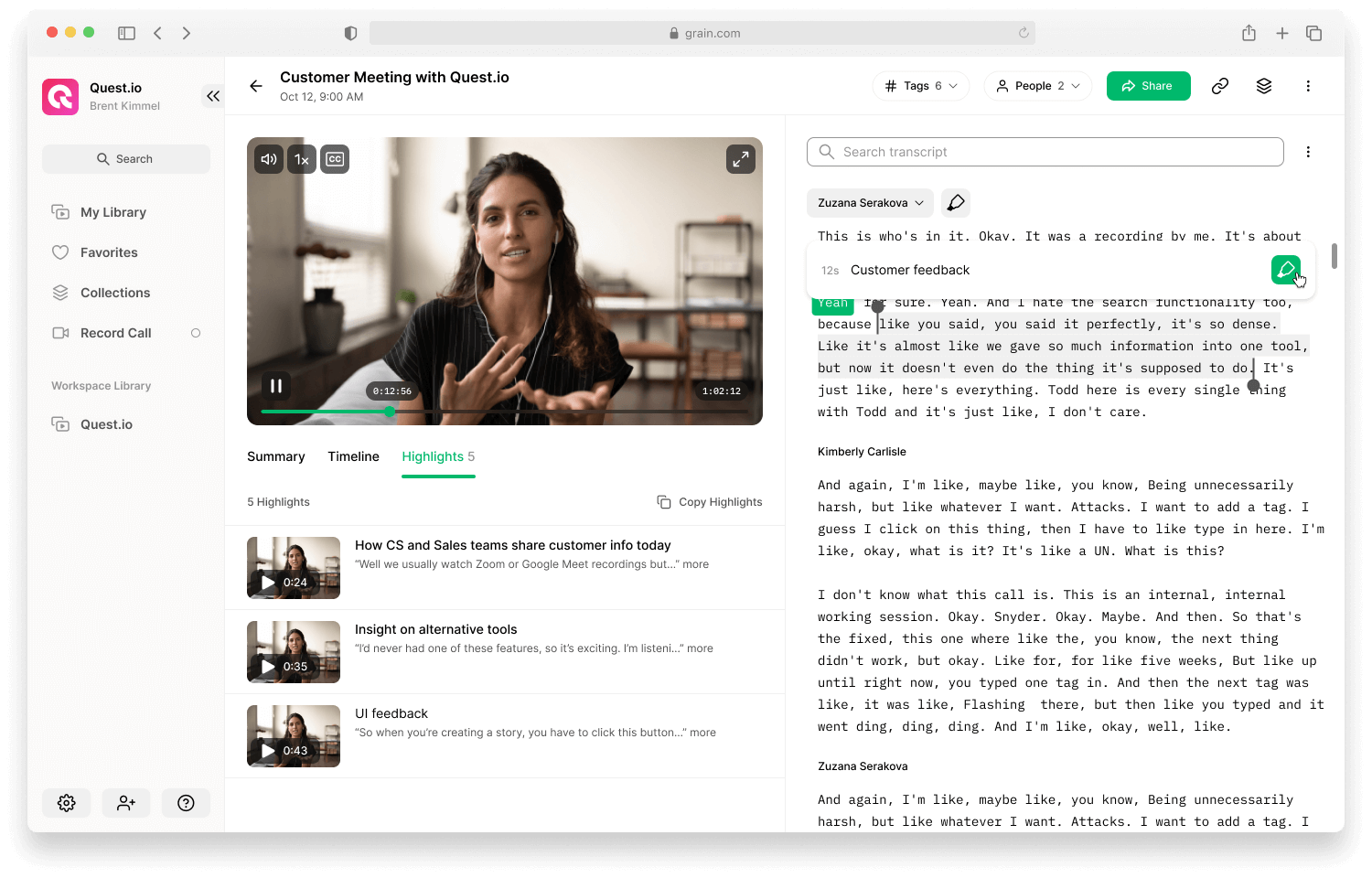The Ultimate Guide to Sales Onboarding
Sales managers are always under pressure to onboard and train new salespeople as quickly as possible. But sales onboarding isn’t always easy.
Take, for example, John. John’s a sales manager at a fast-growing tech startup. To grow the revenue, he has to hire new salespeople and get them up to speed—repeatedly. But he doesn't have a lot of time or resources available. More importantly, he isn't sure where to start.
Most sales managers face the same problem.
If you think about it, hiring salespeople isn’t how you build a successful sales team. It’s just the first step of the process. In reality, onboarding, training, and empowering your sales team with the right knowledge and assets—helps you to hit your revenue goals.
With the right approach, you can onboard and train new salespeople quickly and effectively. From onboarding tips to how sales onboarding software can help, you'll find everything you need to get started here.
Let's dive in!
What is Sales Onboarding?
Sales onboarding is a process that provides new sales hires with the information and resources they need to be successful in their roles.
It's important to note that sales onboarding differs from employee onboarding. Sales onboarding covers topics specific to the sales role including—product knowledge, sales process, objection handling, industry trends, and more.
The goal of sales onboarding is simple: to get new sales hires up to speed and ready to sell as quickly as possible so that they can start generating revenue for the company.
Why Does Sales Onboarding Matter?
Without a strong sales onboarding program, it can take new sales hires several months to become productive. And, that’s a big problem.
Besides, there are several reasons to invest in setting up a good sales onboarding program.👇
It Shortens Time to Productivity
Sales onboarding is important because it accelerates the time to productivity. According to Training Industry Magazine, new sales hires take, on average, 381 days to reach the same level of productivity as tenured sales reps. That's more than a year!
In contrast, when you provide new sales hires with continuous training and support, you can experience up to a 54% increase in new hire productivity.
It Boosts Employee Engagement
Many companies make the mistake of thinking that sales reps don't need onboarding because they're already selling. That's not true.
In fact, many sales reps are disengaged at work because they don't feel supported by their employer. A lack of engagement can lead to high turnover rates, which are expensive (~$97,690 per sales rep) and time-consuming for companies.
Investing in sales onboarding gives your new hires the support they need to succeed. This, in turn, leads to higher levels of employee engagement and higher retention rates. 69% of employees with a stellar onboarding experience are likely to stay with the company for at least 3 years.
Plus, sales onboarding programs allow sellers to connect with each other. This type of relationship-building is essential for maintaining a high level of engagement within the sales team.
It Increases Seller Confidence
When you provide new sales hires with the training and resources they need to be successful, their confidence increases. This is important because sales reps confident in their abilities are more likely to close deals and meet their quotas.
On the other hand, sales reps who lack confidence are more likely to get discouraged and give up easily when facing rejection or any other obstacle. They're also more likely to make mistakes that can cost the company lost revenue.
Investing in sales onboarding is a simple way to boost seller confidence and, as a result, increase sales.
Sales Team Onboarding Tips
What can you do to onboard new sales hires effectively?
1. Develop a Comprehensive Process
The first step is to develop a process for onboarding new sales hires. This process should cover everything from the initial training to ongoing support.
Identify what material new sales hires need to be familiar with and create a schedule for covering it. Then, create a system for tracking their progress and providing feedback.
For instance, if the onboarding program lasts for 3 months, the first 30 days could be dedicated to familiarizing the new sales reps with the company, its products, customers, and the industry. The next 30 days could be focused on developing selling skills, and the last 30 days could be devoted to tracking performance, providing feedback, coaching and support. We'll cover more on the 30 60 90 day plan later.
2. Create a Knowledge Base
One of the best ways to onboard new sales hires is to create a knowledge base they can access anytime, anywhere. This knowledge base should include information about your products, services, industry, company, and more.
Whether in the form of videos, articles, or downloadable PDFs, this material should be easy for new sales hires to find and understand so that they can start selling quickly.
Making this information readily available will also help new sales reps feel more confident in their abilities since they know they can always refer back to the knowledge base if they have any questions.
3. Set Clear Expectations
It's important to set clear expectations with new sales hires. This means communicating what you expect from them regarding sales goals, quotas, and more. For instance, if your company follows OKR or similar frameworks, bring it to their attention.
Be sure to explain how their performance will be evaluated and the consequences of not meeting your expectations. Similarly, lay out what they can expect from you in terms of support, training, and resources.
Setting clear expectations will help new sales hires hit the ground running and avoid any surprises down the road.
4. Assign Onboarding Buddy
One of the most effective ways to onboard a new sales hire is to assign an onboarding buddy. Ideally, it should be someone from the sales team who’s been with the company for a while and knows the ins and outs of your sales setup.
The relationship should be taken seriously by both parties. The onboarding buddy should provide guidance and support when needed but also give new sales reps the space to learn and grow independently.
5. Continuously Optimize Your Process
Finally, it's important to continuously optimize your sales onboarding process. As your company grows and changes, your onboarding process should also evolve.
Regularly review your process and make changes as needed. You should also solicit feedback from new sales hires to identify areas of improvement.
Sales Onboarding 30, 60, 90 Day Plan
If you're looking for a sales onboarding template, you can use this 30, 60, 90 day plan to get started.
Days 1-30:
The first month of the onboarding process should be focused on understanding your product, customers, and existing processes. New sales hires should spend this time learning about your product features, ideal customer profiles, industry, and the team. They should also develop a solid understanding of your sales process.
During this month, in-person training sessions should be supplemented with online training modules, video tutorials, and other materials. Ensure you're recording and transcribing your online training sessions to build a library of training videos for future hires.
Days 31-60:
The second month should be focused on sales onboarding activities like shadowing and role-playing. With the support of demos and presentations, new sales reps should start to get a feel for what it's like to sell your products.
This is also an excellent time to start giving new sales reps some real-world experience by having them work with customers and prospects.
Days 61-90:
The third and the last month of the onboarding process should be focused on selling and coaching your sales hires. New sales reps should spend this time fine-tuning their skills and knowledge so that they can sell more effectively.
However, don't forget to provide ongoing support during this phase. New sales reps will likely have questions and will need some hand-holding from time to time. Schedule regular check-ins so that you can offer guidance and feedback.
How Sales Onboarding Software Can Help
Sales onboarding software helps sales teams manage and streamline their onboarding processes by collecting, organizing, and sharing the necessary training materials, resources, and information new sales hire need.
Thanks to sales onboarding software, it's easier than ever to train and support new sales hires. Here's how setting up onboarding software can help your sales team.
1. Build a Knowledge Base
With the right sales onboarding software, you can create a centralized knowledge base where new sales reps can access all the information they need.
For instance, Grain lets you record, organize, and share sales calls, product demos, training sessions, and more. Once you invite your new hires to Grain workspace, they can watch these videos on their own time and at their own pace.

You no longer have to worry about coordinating in-person training sessions or repeating yourself during one-on-one meetings.
2. Provide Performance Feedback
Gone are the days of having to live-shadow new sales reps as they make calls and conduct meetings. With sales onboarding software, you can easily review call recordings, meeting notes, and key highlights on your own schedule.
Grain, for example, allows your reps to create and share a video reel of key moments from their sales calls. You can review just the highlights of a call and provide targeted feedback that will help new sales reps improve their performance without listening to an entire recording or joining every sales call.
3. Keep Your Team Up-to-the-minute
One of the most challenging things about sales onboarding is keeping new sales reps up-to-date on the latest product updates, customer trends, and market knowledge.
With sales onboarding software like Grain, you can provide your new sales reps with both historical and real-time customer data. When you record your sales calls using Grain, you’re building a video library that contains a treasure trove of valuable information and customer data that can be accessed anytime, anywhere.
Just type a keyword or use #tags and hit search.

In other words, Grain gives new sales reps instant access to the voice of the customer data, which in turn, keeps them informed.
4. Coach Your Sales Reps
Your sales onboarding process will be much more effective if you can provide new sales reps with a clear understanding of your company's sales process.
Unfortunately, though, too many sales teams lack clarity when it comes to their process. As a result, new sales reps are often left to figure things out on their own, leading to inefficiencies and a longer sales cycle.
Imagine trying to explain your process to every new hire and then having to rely on the new reps to remember everything you said. It's a recipe for disaster.
Sales onboarding software like Grain empowers you to easily provide new sales reps with access to recordings of past sales calls, meeting notes, and more. This way, they can see firsthand how deals are typically closed and what works (and what doesn't).
5. Create Sales Enablement Resources
Sales onboarding software can also help you with sales enablement.
For instance, you can create sales enablement content from your existing customer conversations using Grain. From product walk-throughs to video testimonials to training assets, you can spin up new assets by clipping key moments from existing calls.

6. Continuously Support New Sales Reps
Finally, the best sales onboarding software will provide the tools you need to support new sales reps long after they've completed the onboarding process. You won't have to worry about losing touch or forgetting to follow up.
With Grain, you can just have all your sales reps record their calls and organize them to create a library for your sales team. By doing so, you'll be creating a collaborative environment where your sales reps can learn from each other and improve their performance over time.
Wrapping Up
Sales onboarding is a critical process for any company that wants to ensure its sales reps are set up for success. By shortening the time to productivity, boosting employee engagement, and increasing seller confidence, a well-executed sales onboarding program can have a profound impact on your growth.
To take your sales onboarding to the next level, it's worth investing in a sales enablement tool like Grain to provide new reps and account managers with the resources they need learn your sales process, assimilate customer and market knowledge, and close deals faster.
Now that you know all this, it's time to get started on your own sales onboarding plan and build a video library of your own using Grain!


.png)



